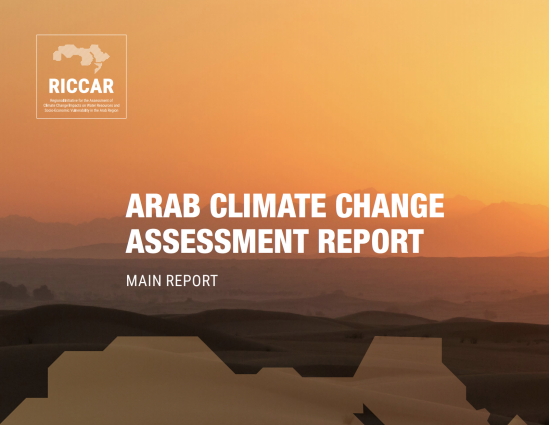UN Report on Climate Change and Water Resources in Arab Region
Published on by Water Network Research, Official research team of The Water Network in Academic
Regional Initiative for the Assessment of Climate Change Impacts on Water Resources and Socio-Economic Vulnerability in the Arab Region

Foreword
This Arab Climate Change Assessment Report (ACCAR) is the outcome of work conducted within the framework of the Regional Initiative for the Assessment of Climate Change Impacts on Water Resources and Socio-Economic Vulnerability in the Arab Region (RICCAR), which was launched jointly by the League of Arab States and United Nations organizations as a response to the first Arab Declaration on Climate Change issued in December 2007.
The report is the first regional assessment to comprehensively assess the impact of climate change on water resources in the Arab region as a single geospatial unit by generating ensembles of regional climate and hydrological modelling projections until the year 2100. It is also the first to conduct an integrated assessment of these climate change impacts as they effect the socioeconomic and environmental vulnerability of Arab States.
Previous analyses of climate change across the Arab region had been drawn from global assessments that segment Arab States between the Asian and African continents or various sub-domains; stand-alone modelling outputs; or country-level studies that aimed for a regionally representative picture, despite differences in assumptions, scenarios and methodologies.
The findings presented in this report fill this gap and are based on a common and uniform methodological framework applied across the Arab region, which thus allows for regional dialogue and exchange among Arab stakeholder groups, whether they are situated on the Atlantic Ocean or the Sea of Oman. This framework was developed under RICCAR through a collaborative partnership involving the League of Arab States, United Nations organizations and specialized agencies. It was realized by engaging scientists and stakeholders in an integrated assessment that considers regional-specific indicators related to geography, climate, water and vulnerability, based on scientific methods.
These findings are also the outcome of the partnership forged with the Adaptation to Climate Change in the Water Sector in the MENA Region (ACCWaM) project, which contributed significantly to the development of the integrated vulnerability assessment applied in this report. Both the preparation and the findings of this report have informed policy dialogue on climate change at the Arab regional level. It has enhanced the capacity of governments, experts and civil society to draw upon climate science to inform decision-making by regularly informing, and engaging with, them throughout the preparatory process via intergovernmental sessions, expert groups, consultative forums, workshops, working groups, task forces and highlevel events.
This has included deliberations that have taken place under the auspices of the Arab Ministerial Water Council, the Arab Permanent Committee for Meteorology and the Arab Group of climate change negotiators that reports to the Council of Arab Ministers Responsible for the Environment. The Implementing Partners and Donors of the Regional Initiative for the Assessment of Climate Change Impacts on Water Resources and Socio-Economic Vulnerability in the Arab Region are thus pleased to present to you – our stakeholders and colleagues – this Arab Climate Change Assessment Report, 10 years after the first Arab Declaration on Climate Change was issued.
It is hoped that this report will continue to inform regional dialogue, priority-setting and positioning on climate change in the Arab region as envisioned under this collaborative regional effort.
Source: United Nations Economic and Social Commission for Western Asia
Read and download the full report: UNECWA
Media
Taxonomy
- Drinking Water Security
- Policy
- Water Scarcity
- Resource Management
- Water Access
- Water Resource Management
- Water Supply
- Scarcity
- Water Scarcity In Desert area
- Climate Change
- Access
- Water Supply
- Drinking Water Managment
- Drinking Water
- Climate